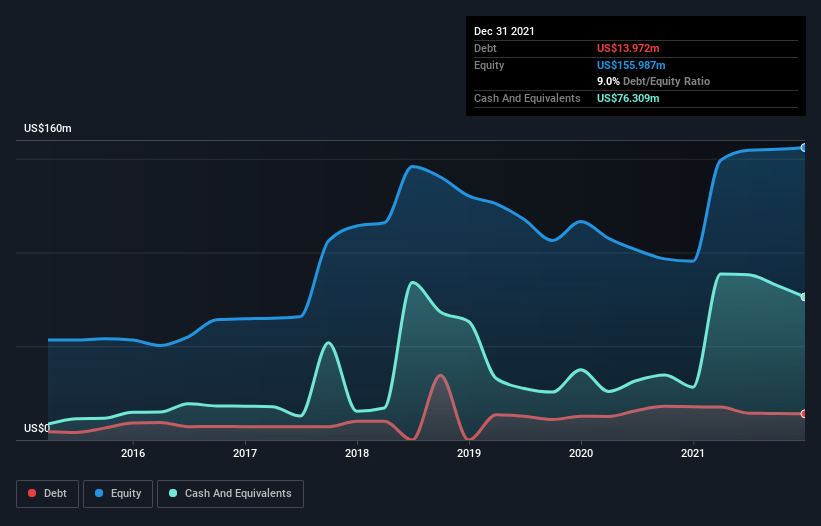
The external fund manager backed by Berkshire Hathaway's Charlie Munger, Li Lu, makes no bones about it when he says 'The biggest investment risk is not the volatility of prices, but whether you will suffer a permanent loss of capital.' When we think about how risky a company is, we always like to look at its use of debt, since debt overload can lead to ruin. As with many other companies Cantaloupe, Inc. (NASDAQ:CTLP) makes use of debt. But the more important question is: how much risk is that debt creating?
When Is Debt Dangerous?
Debt and other liabilities become risky for a business when it cannot easily fulfill those obligations, either with free cash flow or by raising capital at an attractive price. In the worst case scenario, a company can go bankrupt if it cannot pay its creditors. However, a more frequent (but still costly) occurrence is where a company must issue shares at bargain-basement prices, permanently diluting shareholders, just to shore up its balance sheet. Of course, the upside of debt is that it often represents cheap capital, especially when it replaces dilution in a company with the ability to reinvest at high rates of return. When we examine debt levels, we first consider both cash and debt levels, together.
See our latest analysis for Cantaloupe
What Is Cantaloupe's Net Debt?
The image below, which you can click on for greater detail, shows that Cantaloupe had debt of US$14.0m at the end of December 2021, a reduction from US$17.7m over a year. But it also has US$76.3m in cash to offset that, meaning it has US$62.3m net cash.

A Look At Cantaloupe's Liabilities
Zooming in on the latest balance sheet data, we can see that Cantaloupe had liabilities of US$62.6m due within 12 months and liabilities of US$16.5m due beyond that. Offsetting this, it had US$76.3m in cash and US$33.2m in receivables that were due within 12 months. So it can boast US$30.4m more liquid assets than total liabilities.
This short term liquidity is a sign that Cantaloupe could probably pay off its debt with ease, as its balance sheet is far from stretched. Simply put, the fact that Cantaloupe has more cash than debt is arguably a good indication that it can manage its debt safely. There's no doubt that we learn most about debt from the balance sheet. But it is future earnings, more than anything, that will determine Cantaloupe's ability to maintain a healthy balance sheet going forward. So if you're focused on the future you can check out this free report showing analyst profit forecasts.
In the last year Cantaloupe wasn't profitable at an EBIT level, but managed to grow its revenue by 25%, to US$189m. Shareholders probably have their fingers crossed that it can grow its way to profits.
So How Risky Is Cantaloupe?
Statistically speaking companies that lose money are riskier than those that make money. And in the last year Cantaloupe had an earnings before interest and tax (EBIT) loss, truth be told. And over the same period it saw negative free cash outflow of US$643k and booked a US$1.6m accounting loss. But at least it has US$62.3m on the balance sheet to spend on growth, near-term. With very solid revenue growth in the last year, Cantaloupe may be on a path to profitability. Pre-profit companies are often risky, but they can also offer great rewards. There's no doubt that we learn most about debt from the balance sheet. But ultimately, every company can contain risks that exist outside of the balance sheet. We've identified 1 warning sign with Cantaloupe , and understanding them should be part of your investment process.
If you're interested in investing in businesses that can grow profits without the burden of debt, then check out this free list of growing businesses that have net cash on the balance sheet.
New: AI Stock Screener & Alerts
Our new AI Stock Screener scans the market every day to uncover opportunities.
• Dividend Powerhouses (3%+ Yield)
• Undervalued Small Caps with Insider Buying
• High growth Tech and AI Companies
Or build your own from over 50 metrics.
Have feedback on this article? Concerned about the content? Get in touch with us directly. Alternatively, email editorial-team (at) simplywallst.com.
This article by Simply Wall St is general in nature. We provide commentary based on historical data and analyst forecasts only using an unbiased methodology and our articles are not intended to be financial advice. It does not constitute a recommendation to buy or sell any stock, and does not take account of your objectives, or your financial situation. We aim to bring you long-term focused analysis driven by fundamental data. Note that our analysis may not factor in the latest price-sensitive company announcements or qualitative material. Simply Wall St has no position in any stocks mentioned.
About NasdaqGS:CTLP
Cantaloupe
A digital payments and software services company, provides technology solutions for self-service commerce market.
Excellent balance sheet with reasonable growth potential.


